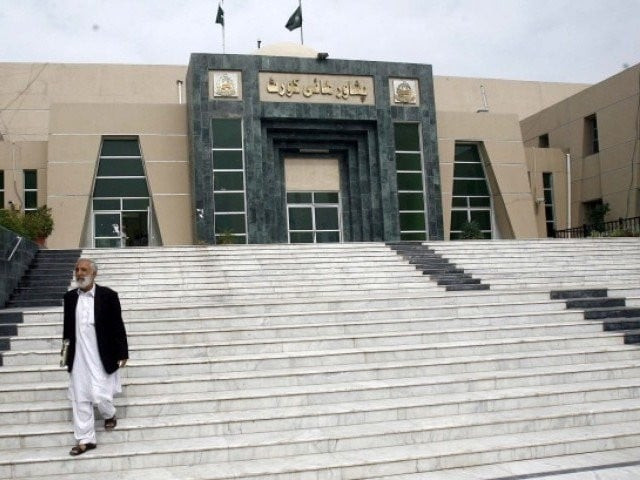Conflicts between NAB, EC assume centre-stage
PHC CJ directs advocate general to assist the court

Peshawar High Court. PHOTO: PPI
Conflicts between the National Accountability Ordinance (NAO) 1999 and the Khyber-Pakhtunkhwa Ehtesab Commission Act 2015 were raised in the Peshawar High Court on Tuesday.
The matter was brought up during a hearing of a series of petitions challenging the 2015 legislation by a bench, headed by Chief Justice Mazhar Alam Miankhel.
Accountability under scrutiny: EC act to be amended after mutual consultation
During the hearing, Justice Irshad Qaiser of the Peshawar High Court said corruption has remained a problem since independence and has spread its roots throughout the country.
“How can you say there is no difference between the 1999 ordinance and Ehtesab Commission act?” she asked Shumial Ali Butt, the attorney for a petitioner. According to Qaiser, there is no plea bargain or voluntary return under the 2015 legislation.
Butt replied the preamble of the Ehtesab Commission act was developed under the Charter of Good Governance which has neither been given legal status nor explained in the Constitution.
“Canada passed its good governance before passing relevant laws,” he said. “However, in Pakistan, no such step was taken and the 2015 act was passed directly.”
Accountability under scrutiny: EC act to be amended after mutual consultation
Beyond remit
Barrister Mudassir Amir, a lawyer for another petitioner, highlighted conflicts between both laws.
“NAO states if anyone misuses authority, takes kickbacks or engages in corrupt practices then the National Accountability Bureau has the exclusive authority to enquire into the matter,” he said. “No other body can interfere in this matter.”
The chief justice directed Advocate General Abdul Latif Yousafzai to assist the bench in this regard.
“The Ehtesab Commission act is against the spirit of Constitution,” Amir said. “There are now two different laws for the same offence. One of them was introduced by Parliament for the entire country while the second one has been introduced by the K-P Assembly for the province.”
Mine games: Ehtesab Commission arrests Ziaullah’s aide

He said the 18th Constitutional Amendment was passed to give autonomy to the province. However, criminal law, criminal procedure and laws of evidence came under the remit of Parliament.
Amir maintained NAO deals with corrupt practices and public office holders and citizens can be dealt with under this ordinance.
“Under Article 141-A, the federal government is responsible for legislating on the federal list,” he said.
Amir added if a province introduces laws that fall within the federal government’s remit, it would be considered a violation of Article 141-A.
Checks and balances: PHC stops Ehtesab Commission from arresting secretary mines
“The 2015 act was given retrospective effect to investigate cases since 2004,” he said. “If a person was cleared by NAB, he is now being investigated by the Ehtesab Commission. This is a violation of fundamental rights under Article 25.”
Amir added if the federal government made law in a specific field, the provinces cannot legislate on the same matter.
During the hearing, lawyers made the argument that NAB has unlimited powers to investigate a corruption case and take the matter to court. However, the DG of the Ehtesab Commission has been given the same powers, which is unacceptable.
They said the NAB chairman can freeze a person’s property for 15 days. Meanwhile, the Ehtesab Commission DG can freeze assets for 30 days which is inconsistent.
Published in The Express Tribune, November 25th, 2015.













COMMENTS
Comments are moderated and generally will be posted if they are on-topic and not abusive.
For more information, please see our Comments FAQ